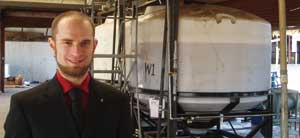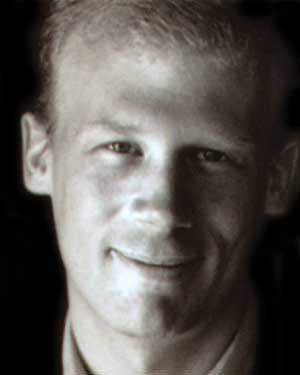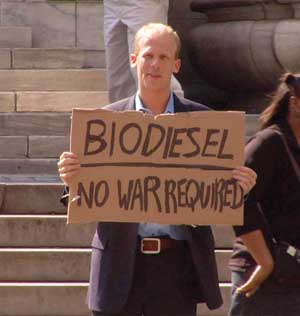From the 'VEGGIE VAN' to the Big Screen





March 17, 2008
BY Kris Bevill
Kumar Plocher was a skeptic when he walked into the invitation-only screening of the film documentary "Fields of Fuel" at the National Biodiesel Board's National Biodiesel Conference & Expo held in early February in Orlando, Fla. The founder and president of Yokayo Biofuels in Ukiah, Calif., already knew about the benefits of biodiesel and how to make it. He had seen a trailer for the documentary and doubted it would be anything more than a long advertisement for the biofuel producers featured in it. In fact, Brent Baker, chief executive officer of New York's Tri-State Biodiesel who was featured in the film, invited Plocher to the screening. So Plocher grudgingly decided to give it a chance, and was a changed man by the time he walked out of the screening.
The film's director, Josh Tickell, an environmentalist, author of the book Biodiesel America and a biodiesel expert, has dedicated his life to educating others about biodiesel. He began making "Fields of Fuel" 10 years ago, but his journey into the realm of the renewable fuel began many years before. When he was 9 years old he moved with his mother and brother from Australia to the Louisiana bayous. As shown in the film, the family lived near oil refineries where he witnessed the detrimental effects the industry had on the health of people in the area. Because of that experience, Tickell was determined to change the way America gets its energy.
The 'Veggie Van'
Before directing "Fields of Fuel," Tickell was known for his biodiesel awareness campaign featuring the "Veggie Van" guy. He captured the attention of the mainstream media by driving a cheap, vibrant-colored van across the country stopping at fast-food restaurants to collect used cooking oil, which he used for fuel. Although his stunt drew a lot of media attention, it didn't achieve the sustained effect on the public's view of biofuels that Tickell desired. So he decided to make a documentary. A decade later he produced the 90-minute ode to biodiesel and biofuel technology called "Fields of Fuel."
It took 10 years to make the film because it was "not your typical big-studio movie," Tickell says. He and his crew were constantly raising money to continue the project. At the same time, biodiesel technology, the subject of the film, was constantly evolving. Tickell managed to raise more than $1 million from company sponsors, private contributors and nonprofits. Many in the biodiesel industry, including Biodiesel Magazine publisher BBI International, provided funding for the film. Biodiesel producers such as Baker's Tri-State Biodiesel and Solozyme in California became sponsors and were featured in the film.
The Film Festival
Those who donated to the film obviously felt it was a important, but no one could have guessed that it would get such a warm reception at the Sundance Film Festival.
Greg Reitman, one of the film's producers, says there are 1,000 documentaries submitted to Sundance and only 16 are selected to be shown during the festival. Of those 16 documentaries, only six awards are handed out at the end of the festival. "Fields of Fuel" was one of the lucky ones this year. The film was handpicked by actor and festival founder Robert Redford for a private screening on the eve of the event's first day, and quickly became the hot ticket. To top it off, the film received the coveted Audience Award.
Even Reitman couldn't have guessed the film would do so well. "I never expected it to be what it is," he says. "When I created my production company I wanted to make films that make a difference in the world-that's what "Fields of Fuel" is all about."
Tickell says the reaction to the film was validation for all the hard work they had done. "We created the movie to be engaging, fun, educational and interesting," he says. "We didn't shy away from controversy. This is not a boring movie about a farm field that turns into a soybean that turns into a jar of fuel. It's a feature-length documentary film that was made for theatres, and people love it. The Audience Award shows that anyone can watch this movie."
Between the Reels
"Fields of Fuel" was designed to help people, who have no prior knowledge of biodiesel, understand what it is and how they can use it. Quick excerpts of government officials talking about energy, snappy cutaways including one about Rudolph Diesel and his mysterious death, and a hip soundtrack make the film attractive to a younger generation of energy enthusiasts. The film demonstrates how biodiesel is made and used, but does so in a way that anyone can understand.
Tickell also wasn't afraid to give time to those with viewpoints that differed from his. Former oil executive Ken Hern, who now heads Nova Biosource Fuels Inc. in Houston, agrees to disagree with Tickell on some issues. But he still felt the film's message was important and agreed to participate, and even became a sponsor. Tickell thought it was important to show other opinions, which may be why the film succeeded. "Joe Jobe [chief executive of the National Biodiesel Board] is featured a lot and so are people who don't think soybeans make a good fuel," he says. "It builds to an agreement that there are many ways to make energy. If you bring together the oil companies, farmers, politicians, youth, environmentalists, media and celebrities they can change anything in society. That's what the film is about. The concept is that we need to move toward independent energy and we need to do it now."
Tickell's lifelong struggle to gain mainstream acceptance for biodiesel is the thread that weaves the film together. His face is the face of biodiesel. It may appear self-indulgent to some, but the film's writer felt it necessary to provide viewers with a personal story in order to illicit the emotional response required to inspire change.
That concept worked on viewers such as Plocher. "There is simply no reason to criticize such a well-meaning, and often very insightful, work of art," he says. Plocher walked out of the theater already forming a plan to make Yokayo's biodiesel affordable for local school districts. He is now working with a San Francisco-area biodiesel producer to offer discounted fuel to school bus fleets. He hopes to have the program up and running with the support of parents and school boards later this year. That kind of reaction is music to Tickell's ears. "That's our objective: to increase the number of people who take action," he says. "We give people options of ways to affect change-large and small."
On the Road Again
This summer, Tickell's mission is to provide everyone in the country with the opportunity to watch the documentary. He is planning a 50-city tour to coincide with film showings, where he will make public appearances and give speeches to further educate and inspire people to reduce our country's dependence on oil. The nationwide tour will begin with the Tribeca Film Festival April 23 through May 4 in New York City. From there, Tickell will lead a biodiesel-fueled caravan through the Northeast and across the country to Seattle, where the tour will continue down the West Coast. Tickell has also been invited to show the film at the Republican and Democratic national conventions.
Following the rave reviews at Sundance, every major studio in North America has approached him to buy the film, but the tour will happen regardless of who distributes the movie, Tickell says. He has three goals to achieve by the end of the tour: to inform as many people as possible about alternative fuels, to get school bus fleet managers across the country to convert to biodiesel and to work with government officials to create a declaration of energy independence. Tickell will be collecting signatures during the tour and will present a petition to presidential candidates at a rally in Washington, D.C., prior to the November election.
Education will be an important aspect of Tickell's tour. In "Fields of Fuel" prescreenings held in cities throughout the country, he was often surprised by the audiences' lack of knowledge of the oil industry. After a screening at a Los Angeles middle school, students said they thought the section of the film concerning the 1970s oil crisis was fictional because they had never heard about it. Tickell believes that about 95 percent of the people who attended question and answer sessions didn't know the difference between biodiesel and ethanol. Through his travels, Tickell determined that more than 60 percent of high school students have a good grasp on what biofuels are, compared with less than 20 percent of people over the age of 20. "I think there's an assumption that people know what biofuels are," he says. "There's a huge disconnect between what the biofuels industry thinks the public knows and what they actually know." If Tickell can bridge that gap of knowledge even just a little before the movie's popularity plays itself out, he will consider it a decade's worth of work well done.
Kris Bevill is a Biodiesel Magazine staff writer. Reach her at kbevill@bbibiofuels.com or (701) 373-0636.
The film's director, Josh Tickell, an environmentalist, author of the book Biodiesel America and a biodiesel expert, has dedicated his life to educating others about biodiesel. He began making "Fields of Fuel" 10 years ago, but his journey into the realm of the renewable fuel began many years before. When he was 9 years old he moved with his mother and brother from Australia to the Louisiana bayous. As shown in the film, the family lived near oil refineries where he witnessed the detrimental effects the industry had on the health of people in the area. Because of that experience, Tickell was determined to change the way America gets its energy.
The 'Veggie Van'
Before directing "Fields of Fuel," Tickell was known for his biodiesel awareness campaign featuring the "Veggie Van" guy. He captured the attention of the mainstream media by driving a cheap, vibrant-colored van across the country stopping at fast-food restaurants to collect used cooking oil, which he used for fuel. Although his stunt drew a lot of media attention, it didn't achieve the sustained effect on the public's view of biofuels that Tickell desired. So he decided to make a documentary. A decade later he produced the 90-minute ode to biodiesel and biofuel technology called "Fields of Fuel."
It took 10 years to make the film because it was "not your typical big-studio movie," Tickell says. He and his crew were constantly raising money to continue the project. At the same time, biodiesel technology, the subject of the film, was constantly evolving. Tickell managed to raise more than $1 million from company sponsors, private contributors and nonprofits. Many in the biodiesel industry, including Biodiesel Magazine publisher BBI International, provided funding for the film. Biodiesel producers such as Baker's Tri-State Biodiesel and Solozyme in California became sponsors and were featured in the film.
The Film Festival
Those who donated to the film obviously felt it was a important, but no one could have guessed that it would get such a warm reception at the Sundance Film Festival.
Greg Reitman, one of the film's producers, says there are 1,000 documentaries submitted to Sundance and only 16 are selected to be shown during the festival. Of those 16 documentaries, only six awards are handed out at the end of the festival. "Fields of Fuel" was one of the lucky ones this year. The film was handpicked by actor and festival founder Robert Redford for a private screening on the eve of the event's first day, and quickly became the hot ticket. To top it off, the film received the coveted Audience Award.
Even Reitman couldn't have guessed the film would do so well. "I never expected it to be what it is," he says. "When I created my production company I wanted to make films that make a difference in the world-that's what "Fields of Fuel" is all about."
Tickell says the reaction to the film was validation for all the hard work they had done. "We created the movie to be engaging, fun, educational and interesting," he says. "We didn't shy away from controversy. This is not a boring movie about a farm field that turns into a soybean that turns into a jar of fuel. It's a feature-length documentary film that was made for theatres, and people love it. The Audience Award shows that anyone can watch this movie."
Between the Reels
"Fields of Fuel" was designed to help people, who have no prior knowledge of biodiesel, understand what it is and how they can use it. Quick excerpts of government officials talking about energy, snappy cutaways including one about Rudolph Diesel and his mysterious death, and a hip soundtrack make the film attractive to a younger generation of energy enthusiasts. The film demonstrates how biodiesel is made and used, but does so in a way that anyone can understand.
Tickell also wasn't afraid to give time to those with viewpoints that differed from his. Former oil executive Ken Hern, who now heads Nova Biosource Fuels Inc. in Houston, agrees to disagree with Tickell on some issues. But he still felt the film's message was important and agreed to participate, and even became a sponsor. Tickell thought it was important to show other opinions, which may be why the film succeeded. "Joe Jobe [chief executive of the National Biodiesel Board] is featured a lot and so are people who don't think soybeans make a good fuel," he says. "It builds to an agreement that there are many ways to make energy. If you bring together the oil companies, farmers, politicians, youth, environmentalists, media and celebrities they can change anything in society. That's what the film is about. The concept is that we need to move toward independent energy and we need to do it now."
Tickell's lifelong struggle to gain mainstream acceptance for biodiesel is the thread that weaves the film together. His face is the face of biodiesel. It may appear self-indulgent to some, but the film's writer felt it necessary to provide viewers with a personal story in order to illicit the emotional response required to inspire change.
That concept worked on viewers such as Plocher. "There is simply no reason to criticize such a well-meaning, and often very insightful, work of art," he says. Plocher walked out of the theater already forming a plan to make Yokayo's biodiesel affordable for local school districts. He is now working with a San Francisco-area biodiesel producer to offer discounted fuel to school bus fleets. He hopes to have the program up and running with the support of parents and school boards later this year. That kind of reaction is music to Tickell's ears. "That's our objective: to increase the number of people who take action," he says. "We give people options of ways to affect change-large and small."
On the Road Again
This summer, Tickell's mission is to provide everyone in the country with the opportunity to watch the documentary. He is planning a 50-city tour to coincide with film showings, where he will make public appearances and give speeches to further educate and inspire people to reduce our country's dependence on oil. The nationwide tour will begin with the Tribeca Film Festival April 23 through May 4 in New York City. From there, Tickell will lead a biodiesel-fueled caravan through the Northeast and across the country to Seattle, where the tour will continue down the West Coast. Tickell has also been invited to show the film at the Republican and Democratic national conventions.
Following the rave reviews at Sundance, every major studio in North America has approached him to buy the film, but the tour will happen regardless of who distributes the movie, Tickell says. He has three goals to achieve by the end of the tour: to inform as many people as possible about alternative fuels, to get school bus fleet managers across the country to convert to biodiesel and to work with government officials to create a declaration of energy independence. Tickell will be collecting signatures during the tour and will present a petition to presidential candidates at a rally in Washington, D.C., prior to the November election.
Education will be an important aspect of Tickell's tour. In "Fields of Fuel" prescreenings held in cities throughout the country, he was often surprised by the audiences' lack of knowledge of the oil industry. After a screening at a Los Angeles middle school, students said they thought the section of the film concerning the 1970s oil crisis was fictional because they had never heard about it. Tickell believes that about 95 percent of the people who attended question and answer sessions didn't know the difference between biodiesel and ethanol. Through his travels, Tickell determined that more than 60 percent of high school students have a good grasp on what biofuels are, compared with less than 20 percent of people over the age of 20. "I think there's an assumption that people know what biofuels are," he says. "There's a huge disconnect between what the biofuels industry thinks the public knows and what they actually know." If Tickell can bridge that gap of knowledge even just a little before the movie's popularity plays itself out, he will consider it a decade's worth of work well done.
Kris Bevill is a Biodiesel Magazine staff writer. Reach her at kbevill@bbibiofuels.com or (701) 373-0636.
Advertisement
Advertisement
Upcoming Events





